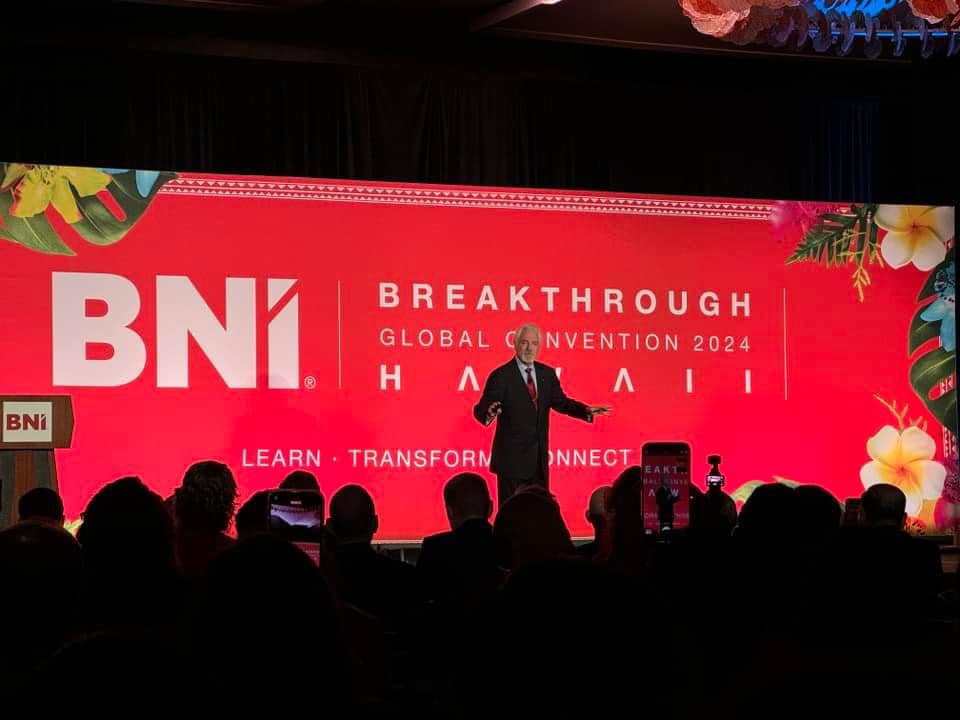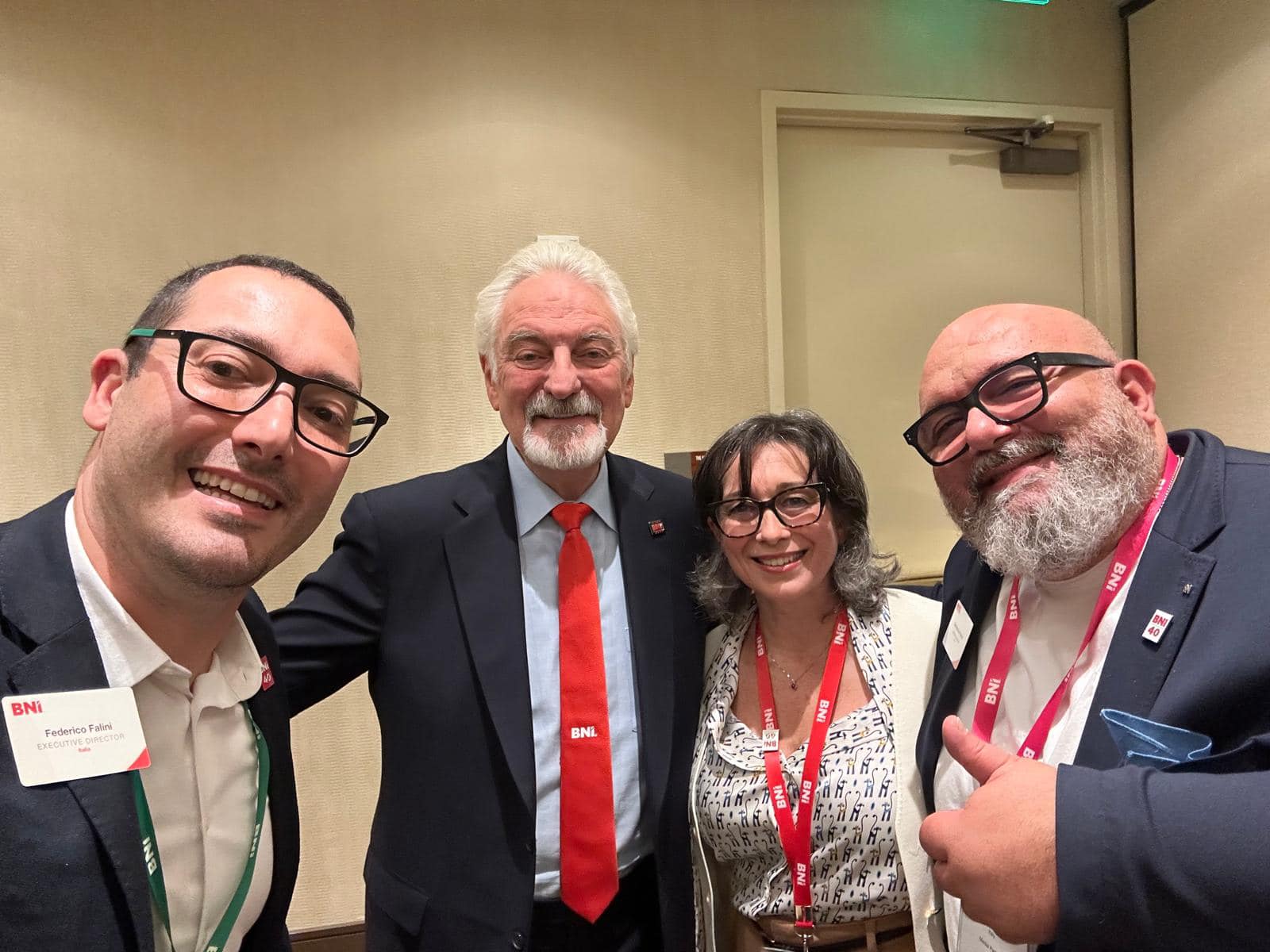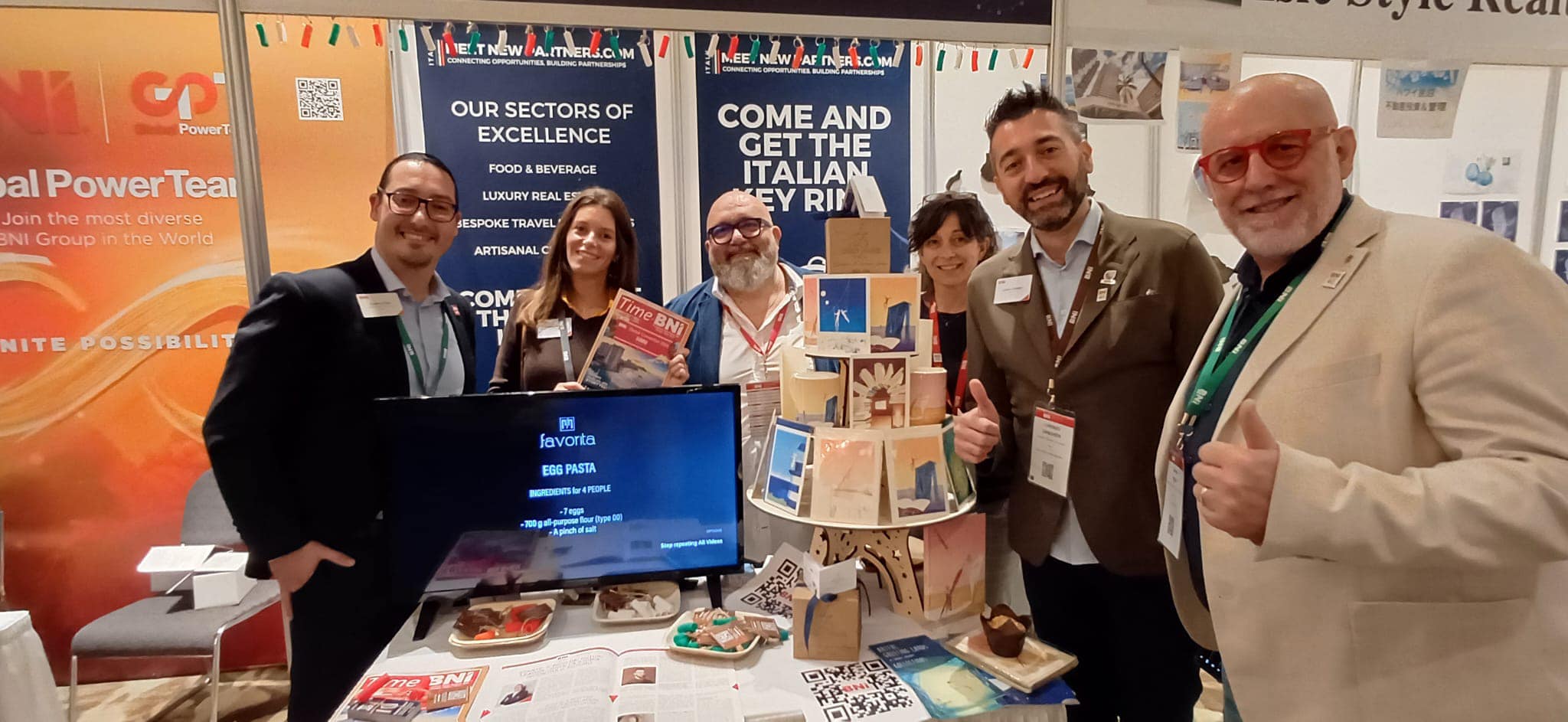At BNI's 40th Global Convention, in Honolulu, Dr. Misner shares insights on turning vision into worldwide impact
In November 2024, Honolulu became a global networking hub. Over three thousand BNI members from around the world gathered for their organization’s 40th anniversary at the Global Convention.
The energy was palpable as flags from 75 countries paraded through the hall. Dr. Ivan Misner would later describe it as “a United Nations event where all countries love each other.” In this unique setting, we sat down with BNI’s founder. Business networking here transcends cultural boundaries. We wanted to explore the journey from a simple idea of mutual support to a global movement that has changed so many lives and businesses.
Q: For the magazine Time of BNI, we are here today with the founder of this incredible international legacy, Dr. Ivan Misner. Dr. Misner, thank you for taking the time to be here with us and share your thoughts.Let’s go straight to the first question. What emotions did you feel opening the venue for this global audience?
A: At this point, I am humbled by what BNI has become. More than 11,200 groups, over 330,000 members, over 75 countries. It’s humbling to see what this little idea, this whole thing where an acorn becomes an oak tree. Bni was an acorn when I started it. My idea was to help some of my friends, and hopefully they would help me. It’s now become this global movement, in effect, and it’s very humbling.
Q: During these four decades, you have faced and overcome many challenges. The first one was to overcome your issue 40 years ago, and that’s why BNI has come to us. Could you share how the concept of overcoming, so to go over, has shaped both BNI’s philosophy and your life?
A: A lot of people will look at someone who’s successful and they’ll say, “Oh, they’re successful. Maybe they didn’t have a lot of challenges, or maybe they didn’t have failures.” Oh, they couldn’t be more wrong. I have had so many failures and so many things not work along the way. But, I’ve always had one philosophy: your failures should be your tuition for success. That it’s okay to fail, but when you fail, you want to use that as a learning lesson. And, throughout most of my life, I would tell those watching or reading this to know that everyone has failures. And that they shouldn’t define themselves by their failures. They should define themselves by their successes and move forward. I had many failures along the way. They started with creating our current system as I tried to figure it out. Back then, there weren’t organizations quite like it. Then we decided to franchise, and I had to figure that out. Then we became international, and I was concerned, will this work in other countries? Then we had an online platform that was incredibly complicated, and then COVID hit.
One of the things I tell people is to always hold the vision, not the obstacles. There’s always going to be an obstacle, no matter what business you’re in. Always hold the vision, and you can get to where you want to go.
Q: May I ask you what your worst mistake in BNI is?
A: The biggest mistake I made, I actually wrote about it in a book called “The Third Paradigm.” The first paradigm is about competition. The second paradigm is about cooperation. And the third paradigm is about co-creation, which is like crowdsourcing. And the biggest mistake I made was what is now BNI Connect, the online platform. I started with competition, letting people compete to see which cream would rise to the top. Silos were created, instead, and everyone said, “No, no, come to my system. My system is better.” It became competitive. Then I tried to get everyone to cooperate. That didn’t work out. Finally, it was a matter of co-creation. I said, “Okay, we’re going to create this together. We’ll do something new and different. It’s not going to be what existed before.” It was a massive challenge. I talk about it in the book, but here’s a secret, okay? It’s not in the book. We talk about a true story in the book, and it’s interwoven. The story is interwoven into every chapter of the book.
We talk about Richard and this online platform. We never say it in the book, but Richard is my middle name, and the online platform is BNI Connect. If anyone ever picks up that book and reads it, I’m Richard. You want to really read about the biggest challenge I ever had? That’s it.
Q: It’s not easy to share mistakes and failures.
Unsuccessful people find it hard to share their mistakes. They tend to define themselves by those mistakes. Most successful people, not all, have a self-aggrandizing sense. But most I’ve met share their mistakes. They want others to succeed. If they want other people to be successful, then it’s important that other people know, “Hey, look, I messed up, too.”
Q: You’ve talked about co-creations, working together in some ways. Yesterday, you opened by talking about the energy we share together. How does this energy tangibly translate into results for the BNI members?
The exercise that you talked about yesterday. It was not a magic trick. It was physics. We often talk about how in a room there is an energy. There’s a sense of energy with the people. It could be negative; it could be positive. One of the things that we’ve seen in BNI is that the larger the groups, the more excited they get, the more energy there is. We talk about energy in this metaphorical way, but it’s not metaphorical. It is literally physical. The exercise that I did yesterday involved a piece of physics equipment. We all stood in a circle and held hands. Then I handed this stick to one other person, and he grabbed it; it lit up and made sound. It was the energy from our hands, our bodies, that was lighting up this physics stick. It was amazing, right? When one of us let go, it stopped. If you remember, I touched the forehead of Dana, my assistant, and it lit up again, just a finger. Energy is not metaphorical. It is literally physical. If you have the right energy in the room with the right people, it feels magical.
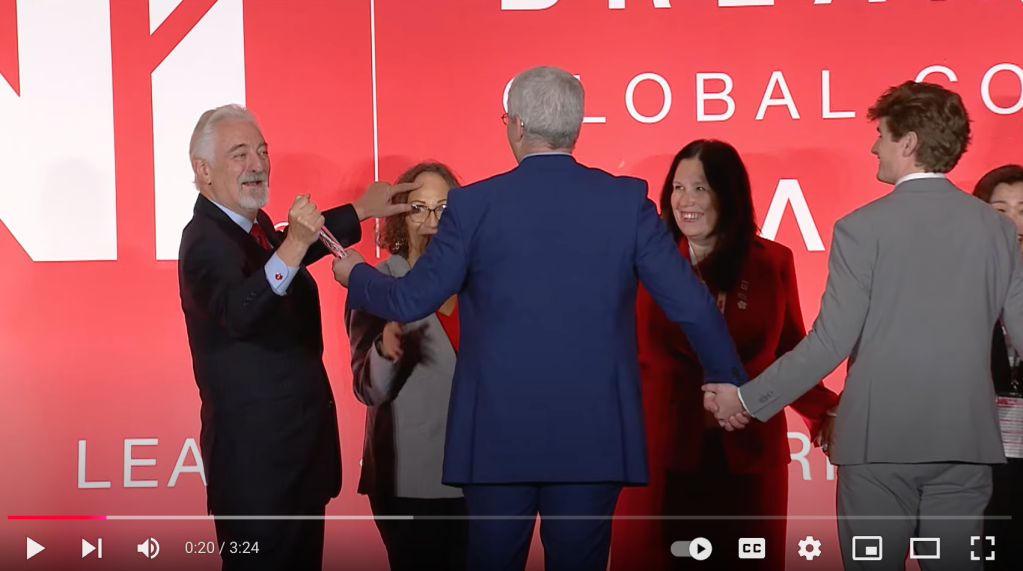
Q: Let’s talk about your new challenges. At this Global Convention, you launched a bold challenge: raise 1 million dollars for the BNI Foundation. Would you talk about it?
A: When my late wife and I created the BNI Foundation, we decided to have it focused on children and education. Many of the projects we did personally involve children’s or educational programs. We say, and she first coined the phrase, children are 20% of the population but 100% of our future. If we help children make something a little bit easier, then they can move on and they can change the world.
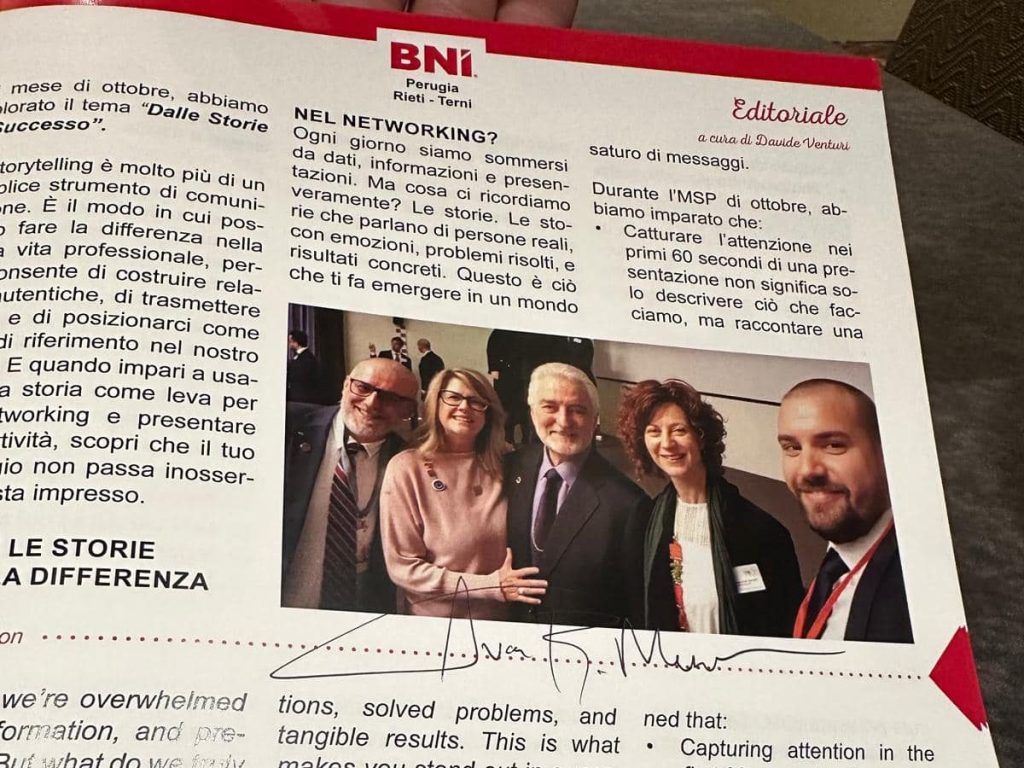
We have to help children. That’s what we felt. We’ve given millions of dollars away in the BNI Foundation. What we’re trying to do is create an endowment. An endowment is a fund. From that fund, the interest from that fund pays for new activities. We’re really close. We’re probably somewhere around $850,000-$900,000 today over our goal of $1 million. My wife, I just got married less than a year ago, and I are doing a dollar-for-dollar match. We hope to be able to hit the $1 million mark at the convention or soon after.
Q: You talked about children. What message would you share with your nephews today? It should help them be happy and fulfilled in 20 years.
A: Sometimes I have children ask me what exactly networking is. And I say to them, “Do you have some close friends?” They say, “Yes.” And I say, “Why are they close friends?” They’ll say, “Well, because they’re nice to me. They’re good to me. I’m good to them. We do things together. We build a relationship.” That’s what networking is. Except, it’s not just friendship. It’s to be friends and do business together. We learned early in BNI that a strong network is that most members are friends. One of the weaknesses of a network is that most members are friends. Friends don’t like to hold friends accountable, but a really good friend will do so gently. That’s what we try to do in BNI. One of our core values is accountability. We’re not a friendship organization. There are social groups out there. We’re not one. We’re a business organization that develops friendships. That first part is what I would say to children.
Q: We are a local community. Given your experience with BNI chapters worldwide, what advice would you give to our regional members to get the most from their BNI membership?
A: Yeah, well, there are four things that I would recommend. The way you worded the question is great because what people will often say to me is, what’s the one thing? What’s the one thing to do? The answer to that is there is no one thing. There’s never one thing. Almost it’s like creating a great meal. If you just have one ingredient, it’s not that great. You have to add things to it to make it work. It’s a recipe. I recommend four things to anyone who wants a powerful network.
First, you need a certain number of people in your network. If your network has only five people, it’s not enough. You’ve got to get out there. You’ve got to connect. Networking is a contact sport. You’ve got to go out and connect with other people. But the second thing is quality. Quantity is one, quality is two, but I wouldn’t rank order it as two. Probably the most important is quality. But here’s the thing. If your network is a mile wide, that is, you have a lot of people, but it’s only an inch deep, it’ll never be very successful.
You need a network that is both wide and, in places, deep. It means you’ve built a relationship with some of these people. And one of the things—it’s not what you know, it’s who you know. It’s how well you know each other. That really counts. Because I’ve got some great contacts in my phone. But the question is, could I call one of them? And would they take my call? If I asked them for a favor, would they say yes? It’s not just who you know, it’s how well you know each other. That’s the second.
Third is engagement. You need to engage. You have to be deeply involved in the program. That’s why lifelong learning is one of our core values. By engagement, that means you have to do one-to-ones with other individuals. As a matter of fact, there was a research study that was done in Italy about one-to-ones.
It was in a region in Italy. It was about one-to-ones. It was a master’s thesis. They took a look at people who did only one 121 a month and compared it to people who did two, three, and four. For those who don’t know, a one-to-one is you and I sitting together and telling each other about our businesses; it’s about sharing each other’s contacts and connections. The people who do four one-to-ones a month, compared to the people who did only one one-to-one a month, gave twice as many referrals to the group, to their network. Twice as many, 100% more. But here’s the amazing thing. They received twice as many referrals, 100% more referrals. When I go to networking groups, I say, “How would you like to double the number of your referrals?” Everybody says “Yes.” I say, okay, do one 121 a week, not one a month, and you’re going to double.
That’s an example of engagement. You have to do those things. You have to get training. We have an online platform for education. You have to do those kinds of things.
The fourth is storytelling. You have to be able to tell your experience in a way that is interesting to people. A great story is a fact wrapped in an emotion that compels people to take action that transforms them in some way. Those are the four pieces of a great story. If you do those four things, you’re going to build a powerful personal network.
A: As we conclude, what message do you have for our local members about their role in building a stronger global BNI community?
A: We are a global community. There are two really big ways that you can recognize that BNI is a global community. One is: come to international conventions like this because they’re amazing. I go to the convention. At the opening, everyone is bringing in the flags from all the countries. Yeah, it’s amazing. I come to the convention, and it’s like going to a United Nations event where all the countries love each other. I mean, that’s incredible. But the second thing is BNI, the online platform. You can connect with anyone in the world through BNI Connect. But don’t try to sell to them. Just say, “I’m looking to do business there,” or, “I’m visiting Italy.” “I’d love to visit your chapter.” There’s almost no network that you could connect with in over 75 countries and say, “Can I visit your chapter? Can I be part of it? Because I’d like to do some business there.” People in BNI roll out the red carpet. “Yes, you’re more than welcome to come.”
Those are two things to do. It’s important to understand, and I’m going to mix metaphors here. Networking is more about farming than it is about hunting. It’s about cultivating relationships with people. And here’s the mixed metaphor. Anyone who wants to build a network must understand this: networking is a marathon, not a sprint. People will join a network, and they run, and run, and run, and run, and run, and they do a few things, and they don’t get any results. They go, “I’ll try another network.” They run and run. They get no results, so they try another network and keep sprinting. Networking is a marathon. It’s a long-term process. But what a great way to build your business. I used to teach people how to cold call. I hated it. It works, but I hated it. Now I teach people how to build their businesses through referrals, and I love it.


